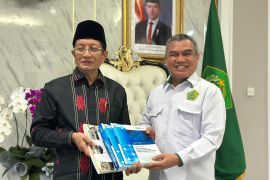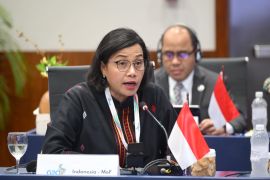Indonesia will ask that the proportional quota policy be balanced with a quota diversion policy from countries that do not fully absorb their Hajj quota.
Indonesian Religious Affairs Minister Lukman Hakim Saifuddin made the statement while arriving in Jidda, Saudi Arabia, on Saturday night. He arrived in Jidda to commence his duties as the Indonesian Hajj pilgrimage leader.
"(We will ask that) the proportional Hajj quota policy be balanced with a quota diversion policy. Countries that do not use their quotas maximally could divert unused quota to countries that have lengthy waiting lists," the minister suggested.
Saifuddin expressed hope that Saudi Arabia and other countries sending people for Hajj pilgrimage would agree to this request, so that Indonesias quota would be increased.
So far, the Hajj quota is set based on the formula of one per one thousand people of the population.
"In reality, this approach is no longer relevant as there are several countries that do not maximally use their quotas, while there are also others that have long waiting lists," he pointed out.
In the last several years, Indonesias annual quota was reduced to 168,800 due to the expansion of the Haram Mosque. The quota is divided into 155,000 regular Hajj pilgrims and 13,600 others under a special Hajj pilgrimage program.
As a result, the waiting list in several regions in Indonesia could reach 20 years. This leads to an increase in the number of aging pilgrims from Indonesia and has an impact on the health of the pilgrims.
On the occasion, the minister also shed light on the implementation of the current Hajj pilgrimage season. Indonesia is currently due to dispatch the last batch to the Holy Land.
He said that overall, there is no significant constraint.
"The problem is only about visas. This happens not due to a delay but due to a lack of coordination and communication. We need to develop better coordination and communication. There are pilgrims who should be departing in the second embarkation phase but instead force themselves to depart in the first phase," he explained.
The change in the departure formulation hinders the previous departure configuration, which had been earlier formed in the flight schedules.
"We want to increase communication with the Hajj Pilgrimage Guidance Group and officials on the field, so that they will be more firm and consistent in implementing the rule," the minister emphasized.
Saifuddin said his side will issue a regulation that bans a change in the flight batch formats.
(A014/INE/o001)
EDITED BY INE
(T.A014/B/KR-BSR/O001)
Editor: Aditia Maruli Radja
Copyright © ANTARA 2016











